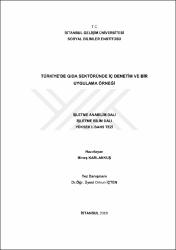| dc.contributor.author | Karlankuş, Mineş | |
| dc.date.accessioned | 2020-06-25T23:35:54Z | |
| dc.date.available | 2020-06-25T23:35:54Z | |
| dc.date.issued | 2019 | en_US |
| dc.date.submitted | 2019-09-09 | |
| dc.identifier.uri | https://hdl.handle.net/11363/2266 | |
| dc.description | Danışman: DR. ÖĞR. ÜYESİ ORKUN İÇTEN
Yer Bilgisi: İstanbul Gelişim Üniversitesi / Sosyal Bilimler Enstitüsü / İşletme Anabilim Dalı / İşletme Bilim Dalı
Konu: İşletme = Business Administration | en_US |
| dc.description.abstract | İşletmeler amaçlanan hedefler doğrultusunda faaliyet gösterirken belirli kurallara uymak zorundadırlar. Küresel rekabet ortamında büyümek ve gelişmek isteyen şirketler; kontrol, denetim ve risk yönetimine öncelik vermektedir. Kurumların önceliği, mevcut ve potansiyel riskleri etkin ve etkin bir şekilde yönetmenin yanı sıra uzun vadede yüksek performansı korumak için iç kontrollerin kalitesine ve denetimine odaklanmaktır. İç denetim ve iç kontrol kavramları günümüzde çok büyük önem taşımaktadır. İç kontrol, bir işletmenin yönetim kurulu, yönetim ve diğer personelinden etkilenen ve çeşitli kategorilerdeki hedeflere ulaşma konusunda makul güvence sağlamak üzere tasarlanmış bir süreçtir. İç kontrol, finansal raporlamanın güvenilirliği, etkili ve verimli işletme işlemlerinin kanun ve yönetmeliklere uygunluğun kilit unsurlarından biridir. İç kontrol bir işletmenin hedefleri doğrultusunda ilerlemesine katkı sağlar. Bu açıdan işletmenin amaçlarına ulaşmasına yardım eder ve sonuçta da işletmenin devamlılığını artırır. İç kontrol sisteminin olmadığı ya da etkinliğinin sağlanmadığı durumlarda; varlıkların kaybına, yönetimin eksik ya da hatalı kararlar almasına, suistimallere ve çeşitli kayıplara sebep olabilmektedir. İç kontrol, standart prosedürleri uygulayarak operasyonların verimliliğini arttırır; kontrol süreçlerine, süreçlerin standart tanımlarına, iş tanımlarına ve kural düzenlemelerine değer katmaktadır. Bu nedenle, yönetimin etkinliği ve verimliliğinin teşvikine katkıda bulunur. Ayrıca iç kontrol bir işletmenin mevcut varlıklarını kontrol mekanizmaları aracılığıyla güvence altına almaya yardımcı olur. İşletmeler büyüdükçe varlıklarını güvence altına almak sistematik bir sorun haline gelmektedir. Bu çalışmada Türkiye'de gıda sektöründeki iç denetim faaliyetleri hakkında bilgi verilmesi amaçlanmıştır. | en_US |
| dc.description.abstract | Businesses must comply with certain rules while operating in line with their intended objectives. Companies that want to grow and develop in a global competitive environment prioritize control, audit and risk management. The priority of the institutions is to effectively and effectively manage existing and potential risks, as well as focus on the quality and control of internal controls to maintain high performance over the long term. Internal audit and internal control concepts are of great importance today. Internal control is a process designed to provide reasonable assurance that the board of directors, management and other staff of a business is subject to achieving targets in various categories. Internal control is one of the key elements of the reliability of financial reporting, effective and efficient operation procedures and compliance with laws and regulations. Internal control contributes to the progress of an enterprise in line with its objectives. In this respect, it helps the business to achieve its goals and, consequently, increases the continuity of the business. In cases where there is no internal control system or its effectiveness is not ensured; loss of assets, misappropriation or misappropriation of management, fraud and various losses. Internal control increases the efficiency of operations by applying standard procedures; It adds value to control processes, standard definitions of processes, job descriptions and rule regulations. Therefore, management contributes to the promotion of efficiency and efficiency. In addition, internal audit helps to secure an entity's existing assets through control mechanisms because it becomes a systematic problem to secure assets as the asset grows. This study was aimed to give information about internal audit activities in the food sector in Turkey. | en_US |
| dc.language.iso | tur | en_US |
| dc.publisher | İstanbul Gelişim Üniversitesi Sosyal Bilimler Enstitüsü | en_US |
| dc.rights | info:eu-repo/semantics/openAccess | en_US |
| dc.rights | Attribution-NonCommercial-NoDerivs 3.0 United States | * |
| dc.rights.uri | http://creativecommons.org/licenses/by-nc-nd/3.0/us/ | * |
| dc.subject | İşletmeler | en_US |
| dc.subject | İç Denetim | en_US |
| dc.subject | İç Kontrol | en_US |
| dc.subject | Türkiye'deki Gıda Sektörü | en_US |
| dc.subject | Businesses | en_US |
| dc.subject | Internal Audit | en_US |
| dc.subject | Internal Control | en_US |
| dc.subject | Food Sector in Turkey | en_US |
| dc.title | Türkiye'de gıda sektöründe iç denetim ve bir uygulama örneği | en_US |
| dc.title.alternative | An internal audit and practices in the food sector in Turkey | en_US |
| dc.type | masterThesis | en_US |
| dc.department | Sosyal Bilimler Enstitüsü | en_US |
| dc.relation.publicationcategory | Tez | en_US |



















